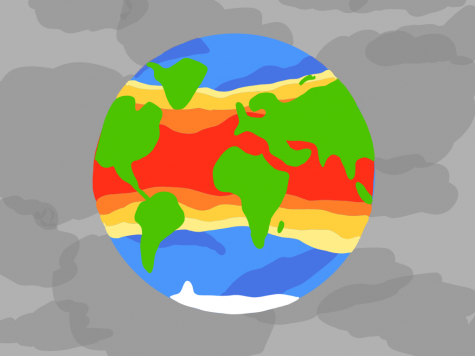Infamous pandemic
April 22, 2021

At the risk of stating the obvious, we live during a pandemic. Caused by an invisible, airborne agent, this disease has spread to every corner of the globe, resulting in innumerable deaths and manifest suffering, exacerbating issues of injustice.
Thousands of researchers from around the globe have cooperated to help understand the extent of this disease and to discern effects of its continued spread. Historians tell us that this is not the first time that the world has seen similarly caused upheaval, but without drastic intervention, exponential fallout is inevitable.
Scientists and politicians have developed strategies to slow the disease’s march and reduce its nefarious effects, but partisan divides have frustrated efforts to heal. Some dismiss the disease as a hoax, but to the clear headed, it represents an existential crisis. The disease of which I speak is, of course, global climate change. (What? Were you thinking of something else?)
Although not normally described as a pandemic, the similarities between global climate change and COVID-19 are many. For both, early calls for immediate and drastic intervention to reduce global suffering were frustrated by doubts cast on the veracity of the science. Initial skepticism was rife, and conspiracies were advanced to dismiss the very existence of the threat. Now, the verdict is in.
Scientists, who are skeptical by training, have spoken clearly. About every seven years, the United Nations’ Intergovernmental Panel on Climate Change, a diverse group of more than 800 international scientists, publishes a report detailing the current and future effects of climate change. Most recently, they concluded with greater than 95% certainty (the gold standard for science) that global climate change is real and results primarily from human-caused emissions of planet-warming gasses.
In short, the people most qualified to return a verdict concluded that human-caused “warming of the climate is unequivocal.” If we think that science can teach us anything at all, the debate on the reality of human-caused climate change is closed.
So, the planet is a degree or so warmer – what’s the big deal? Although weather fluctuates from day to day, relatively small changes in long-term climate have drastic effects. When temperatures warm, when precipitation fluctuates, when sea levels rise, they don’t change slowly and predictably.
Humans are good at adjusting to methodical changes. But, small long-term average changes arise from the accumulation of drastic short-term disruptions. Deadly heat waves become more frequent; parching droughts lengthen, devastating floods deepen, raging hurricanes intensify.
The World Health Organization estimates that climate change causes 150,000 deaths per year.
As sobering as this number is, it obscures two important points. First, disruption and despair greatly exceed outright death. Many more people have been displaced, have lost livelihoods, and have become impoverished due to human-caused climate change. Second, negative effects of climate change are not shouldered equitably.
The developed world has built its wealth on the engine of fossil-fuel-based, climate-warming economies. The United States ranks fourth (behind Saudi Arabia, Kazakhstan, and Australia) in per capita carbon dioxide emissions. Because of their wealth, developed countries can also insulate themselves from many of the worst effects of climate change. But, because climate change is global, the developing world bears a disproportionate and crippling cost. Fortunately, there are few who would look a Sub-Saharan farmer in the eye, strike a match, and then torch her fields. Unfortunately, the results of living a fossil-fuel-intense Western lifestyle can, from a great distance, carry the same effect. In short, for those who care about social justice and the welfare of the global poor, the harm of climate change cannot be ignored.
In its pernicious and inequitable effects on humans around the globe, the climate change pandemic shares much with COVID-19. But, in other important ways it differs. First, there are optimistic indications that global vaccine distribution (fraught with its own injustice) will soon tame COVID-19. There are, unfortunately, no such optimistic indications for climate change. There has not been the urgent and concerted global response to this pandemic that is needed to turn the tide.
Second, as devastating as COVID-19 is, its damage is borne by a single, high-profile species: Homo sapiens. The climate change pandemic, however, touches nearly every ecosystem on the globe. In the history of planet earth, there have been five mass extinction events, when approximately 70% or more of species have been wiped out in a geologically short period. Biologists argue that we are in a sixth mass extinction, caused, at least in part, by climate change. Historically, these mass extinctions were triggered by cataclysmic events, like asteroid impact or mass volcanic eruptions.
Historically, these mass extinctions were associated with large-scale atmospheric disruptions and rapid climate change. Presently, our mass extinction is caused by a single species, unwilling to curb its insatiable and myopic desire for growth, for quick wealth, and for a particular fuel.
For those who respect the ability of science to teach us about the world, for those who care about the health and welfare of the most vulnerable people among us, and for those who believe that humans have been uniquely called to care for the health and welfare of all creation, the time to act on climate change is upon us.
There is a vaccine for this disease, but it doesn’t come in a vial. The cure involves a willingness of the globally wealthy to sacrifice some current comfort for the sake of our global neighbors.
Are you in?


























































































